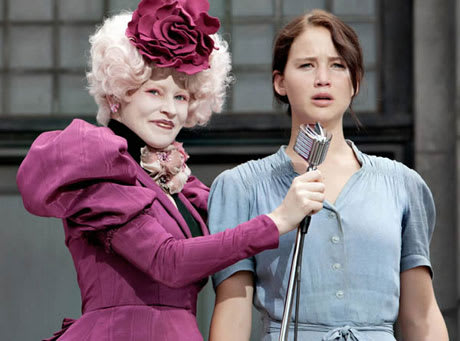You'd have to be conducting an exercise in avoidance of all things pop culture to be unfamiliar with at least the general premise of young adult literary smash The Hunger Games. Borrowing liberally from book-to-screen forbearers Battle Royale, The Running Man and 1984, the dystopian future described by author Suzanne Collins is an extreme depiction of wealth disparity. Twelve impoverished districts must offer up randomly selected "tributes" – childen between the ages of 12 and 18 – to complete in a televised battle to the death for the amusement of opulent wealth centre the Capitol. Seabiscuit director Gary Ross has mixed success bringing this broadly relatable vision to the big screen. Some peculiar pacing decisions and minor shifts in how characters respond in key situations hinder the intended immersive sense of realism even more so than the special effects, which are barely network television grade. The most striking aspect of Ross's cinematic adaptation is his insistence on maintaining the intimate personal horror of Katniss Everdeen's experience as an unwitting catalyst for the mobilization of civic unrest, not that the seeds of the grander plot are planted with much finesse. It's a shame that the noble intentions of his approach fail to generate the compelling momentum of the book's event-heavy first-person narrative. By employing the aesthetic of cinéma vérité, Ross allows star Jennifer Lawrence's emotionally nuanced performance to act as a window into Katniss's interior life. The director demonstrates a fundamental understanding of the story's themes of oppression and exploitation in the exhausting two-hour-plus "The World Is Watching: Making the Hunger Games," explaining his motivation to avoid stylized violence since that's what the Capitol craves, but fails to address his marginalization of how life in the districts is affected by the games. Instead, he relentlessly harps on the importance of preparation and joins an effusive chorus of praise for Jennifer Lawrence and preposterously aggrandized proclamations of the story's cultural importance. All the stages of production are fawned over in detail, with the producers always quick to point out how pleased Suzanne Collins is with all the story changes, although she doesn't make an appearance to say so herself. As if all that's not more than enough, this double-disc Blu-Ray has six more features, expanding on the overall phenomenon, Donald Sutherland's emphatic fan-girlish response to the material, the decision to present some of Katniss's interior monologue through the expanded character of Seneca Crane, a mostly redundant conversation between Gary Ross and a film critic, a script-to-storyboard-to-screen comparison and the full version of President Snow's propaganda film, which was plenty of background info on the history of Panem in the movie. So, why include a redundant dust jacket synopsis at the beginning of the film, Mr. Ross?
(Alliance)The Hunger Games [Blu-Ray]
Gary Ross

BY Scott A. GrayPublished Aug 30, 2012